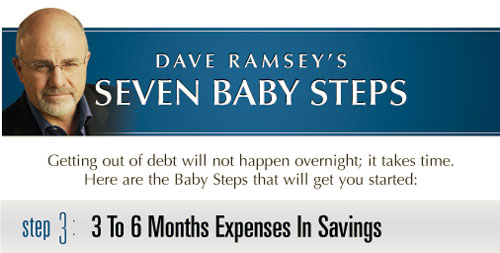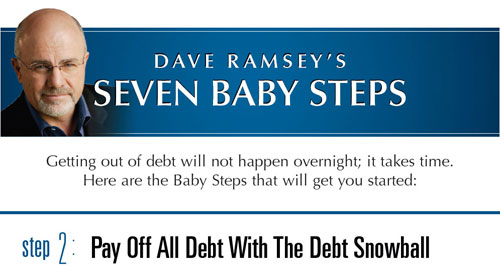Last time we looked at Baby Step 2, paying off all your debt using the debt snowball. You take your bills, put them in order from smallest amount to largest amount, and proceed to pay them off one by one, snowballing the amounts until the debts are gone!
Baby Step 3 – 3 To 6 Months Of Expenses In Savings
In baby step 1 we built up a $1000 emergency fund in order to protect us from life's little emergencies. In baby step 3 we are going to take our emergency fund to the next level, and continue building it until you have at least 3-6 months of expenses saved up. Dave Ramsey calls it the “fully funded emergency fund of 3-6 months of living expenses“.
Why do you need to build up your balance in your emergency account? This larger balance will allow you to build up an umbrella to keep you protected from the storms of life. Because life events WILL happen. When you have a fully funded emergency fund, you're less likely to ever have to go into debt again.
When you have a fully funded emergency fund of 3-6 months, there aren't many things that can happen that would cause you to be in immediate danger. Lose a job? You'll be able to cut back and cover your mortgage long enough to find another job. Have your appendix rupture? You'll be able to cover your large health insurance deductible.
Having that large emergency fund will help mitigate the risk of unplanned negative events – of which we will all have encounters with many times in our lifetimes.

Why Are Emergency Funds So Important?
I've heard a lot of people say that they think this emergency fund of 3-6 moths is too large (we thought it was too small and have saved closed to 8-10 months of expenses), and they can't imagine ever having to use that much money to fix a problem. Why not instead invest the money or use it for a vacation?
Money magazine says that 78% of us will have a major negative event happen in any given 10-year period of time.
Here are just a few of the reasons why we've saved up our emergency fund.
- Negative events DO Happen: As the quote on this page says, 78% of us will have a major negative event happen in any given 10 year period. Those are pretty good odds.
- Less Stress: When you have an emergency fund to fall back on, there is a lot less stress worrying about how you're going to pay the bills.
- Risk Is Managed: An emergency fund (along with other things like health insurance, disability insurance and life insurance) will give you a situation where you have substantially less risk of having a bad situation turn into a horrible one. A hospitalization won’t turn into bankruptcy, and a job loss won’t turn into a foreclosure. Plan for problems, before they happen. Don't allow problems you could have planned for turn into life changing events.
How Much Is Enough?
When talking about a fully funded emergency fund, you'll need to talk with your family about how much you want to save. Ramsey suggests that you save 3-6 months of expenses, but that can obviously change based upon your situation. Factors to take into account include number of children, job stability and other factors. For example, if you're expecting to be laid off, you'll probably want to save up as much cash as fast as you can. In a stable job with no kids? A smaller amount might work. The very baseline amount that Dave Ramsey speaks of is 3-6 months of expenses.
How much should you save? An example: If your family has a minimum of $2500 in expenses every month after cutting out all the un-necessary bills, your 3-6 months of expenses would come out to anywhere from $7500-$15,000.
At our house we like the peace of mind that comes with the emergency fund, plus we have a child – so we have saved up 10 months in our emergency fund currently. Figure out the correct amount for your family and situation.
Can I Invest My 3-6 Months Of Savings?
One question that often comes up is this – “Should I invest my emergency fund in a CD, or a mutual fund?”. Usually the answer to that would be no – you want to keep the emergency fund pretty liquid, and accessible. That's the reason for the emergency fund – for unplanned and unexpected emergencies!
Personally I prefer to save the bulk of my money is a good high-yield savings account, like the ones offered by Ally Bank. I then keep $1000 in my local bricks and mortar bank as well just in case I need it in a hurry.
Don’t put your emergency fund in things where you can't get at it fast – like real estate, mutual funds or by investing in a cousin's business. Keep your emergency fund liquid!
Do you think saving up 3-6 months of expenses is enough? How much do you have saved in your large emergency fund? Do you prefer to use credit cards as your emergency fund? Tell us your thoughts in the comments.


